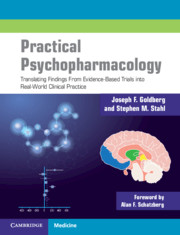 Practical Psychopharmacology
Practical Psychopharmacology Book contents
- Practical Psychopharmacology
- Practical Psychopharmacology
- Copyright page
- Dedication
- Contents
- Foreword
- Preface
- Abbreviations
- Part I General Principles
- Part II Targets of Pharmacotherapy
- 13 Disordered Mood and Affect
- 14 Disorders of Impulsivity, Compulsivity, and Aggression
- 15 Psychosis
- 16 Deficit States and Negative Symptoms
- 17 Anxiety
- 18 Addiction and the Reward Pathway
- 19 Trauma and Post-traumatic Stress Disorder
- 20 Personality Disorders and Traits
- 21 Cognition
- 22 Putting It All Together
- References
- Index
21 - Cognition
from Part II - Targets of Pharmacotherapy
Published online by Cambridge University Press: 19 October 2021
- Practical Psychopharmacology
- Practical Psychopharmacology
- Copyright page
- Dedication
- Contents
- Foreword
- Preface
- Abbreviations
- Part I General Principles
- Part II Targets of Pharmacotherapy
- 13 Disordered Mood and Affect
- 14 Disorders of Impulsivity, Compulsivity, and Aggression
- 15 Psychosis
- 16 Deficit States and Negative Symptoms
- 17 Anxiety
- 18 Addiction and the Reward Pathway
- 19 Trauma and Post-traumatic Stress Disorder
- 20 Personality Disorders and Traits
- 21 Cognition
- 22 Putting It All Together
- References
- Index
Summary
Attentional problems are among the most ubiquitous and nonpathognomonic of psychiatric complaints. Nearly all psychiatric disorders impact cognitive functioning in one form or another, and it can be a challenge for clinicians to differentiate free-standing disorders of cognition (e.g., adult ADHD or dementia) from those that are iatrogenic (due to psychotropic or nonpsychotropic medications) or the epiphenomena of other conditions (such as depression, mania, anxiety, or schizophrenia). Cognitive problems involve distinct domains that can form unique constellations and present differently from one psychiatric disorder to another (e.g., skip ahead to Table 21.2). Sometimes they may be just one facet of a more complex, heterogeneous phenotype. Consequently, pharmacotherapies for cognitive problems in one disorder (say, dementia) may not so neatly extrapolate to those of another (say, ADHD). Cognitive problems may be profound and all-encompassing (as in dementia, some developmental disorders, or schizophrenia), artifactual (as in depression-related cognitive dysfunction (formerly called pseudodementia)), or subtle (as might occur in anxiety disorders or high-functioning patients with mood disorders).
- Type
- Chapter
- Information
- Practical PsychopharmacologyTranslating Findings From Evidence-Based Trials into Real-World Clinical Practice, pp. 485 - 499Publisher: Cambridge University PressPrint publication year: 2021


